For more in-depth reviews of each of these and other popular keyword suggestion tools, keep on reading!
What is a Keyword Research Tool?
A keyword research tool is a software or online service that helps you identify and analyze the keywords and phrases people use when searching for information, products, or services online.
The tool uses different methods to collect and analyze data from search engines and other online sources to provide insights into the most popular search terms, their search volume, and the level of competition for those terms.
Why Do You Need Keyword Suggestion Tools?
You need keyword suggestion tools to identify the relevant and high-traffic keywords that your target audience is searching for. With the help of keyword research tools, you can optimize your online content and advertising campaigns.
In addition to this, there are several other benefits to using keyword research tools, including:
- Understanding Your Audience Better: By analyzing the search terms that people use to find information, products, or services in your industry, you can gain insights into their needs, preferences, and pain points, which can help you create more effective content and marketing campaigns.
- Staying Ahead of the Competition: Keyword research tools can help you identify the keywords that your competitors are targeting and the level of competition for those keywords.
You can also gauge search intent for each keyword and discover new content ideas for your website. Through keyword research and analysis, you can find gaps in the market and target niche keywords that your competitors are not yet targeting. - Boosting Your ROI: Keyword research tools can help you find the best keywords to target in your pay-per-click (PPC) advertising campaigns, which can help you improve your click-through rates (CTR), reduce your cost-per-click (CPC), and increase your return on investment (ROI).
Overall, keyword research tools can help you make data-driven decisions about your online marketing and content strategy. Using them, you can attract more traffic, leads, and sales to your website or online business.
What to Look For When Choosing a Keyword Research Tool
When choosing a keyword research tool, there are several factors to consider a tool that meets your needs and helps you achieve your goals.
Here are some of the most important factors to look for when choosing a keyword research tool:
- Keyword Data: Look for a tool that provides accurate and reliable keyword data, including search volume, competition, and other metrics. The data should be up-to-date and relevant to your location and target audience.
- Functionality: The tool should offer keyword suggestion features that help you discover new and relevant keywords, including long-tail keywords and related search terms.
The tool should also help you analyze your competitors' keyword strategies, including the keywords they are targeting, their ranking positions, and their ad campaigns. - User-friendly Interface: Look for a tool with a user-friendly and intuitive interface that is easy to use, even for beginners. The tool should offer clear and actionable insights that help you make informed decisions about your keyword strategy.
- Pricing: Consider the cost of the keyword suggestion tools you are considering, and choose one that fits within your budget.
Some tools may offer a free trial or a limited version with basic features, which can help you to evaluate whether the tool is right for you before committing to a paid plan. - Reviews: Look for reviews and feedback from other users who have used the keyword suggestion tools you are considering. This can give you an idea of the effectiveness and reliability of the tools.
By considering these factors and then doing your research, you can choose a keyword research tool that is right for you.
List of Top 20 Keyword Analysis Tools
Finding the right keyword research software program for your business requires careful research.
There are a vast number of keyword research tools available in the market, but the sheer number of options can be overwhelming.
Each tool has its own unique features and functionalities, which can make it challenging to find the best one for your specific needs.
1. Semrush
Semrush has a comprehensive suite of tools for keyword research. Using it, you can find your competitors’ keywords and track the changes in their position over a specific period of time. You can also use it to find the search volume, keyword difficulty, user intent, and more.
Semrush has a large database of over 20 billion keywords, which provides a comprehensive view of the online landscape.
I’ve been using Semrush for a while now, and I love how all the keyword data is presented in an organized manner. Plus, its user-friendly interface makes it easy for even beginners to use.
How to Use Semrush for Keyword Research
Semrush has multiple keyword research tools. When you log in to your Semrush account, you’ll be able to see five tools listed on the left bar of the dashboard under the header, “Keyword Research.”
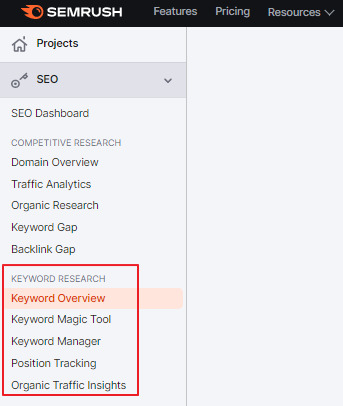
In this section, I’ll give you a brief overview of how you can use each of these tools for keyword research:
- Keyword Overview
This keyword suggestion tool gives you a quick overview of all the key keyword metrics — CPC, search volume, keyword difficulty, trends, top-ranking pages, ad copy, keyword ad history, and more.
To use it, you can enter any keyword in the search bar, and click on “Analyze.” Here’s the report for the keyword, “how to buy audible membership:”
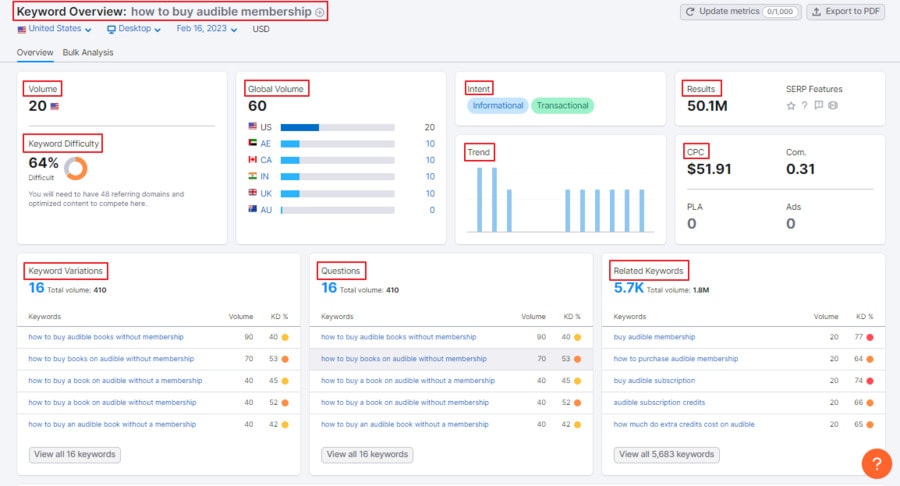
- Keyword Magic Tool
If you want to conduct in-depth keyword analysis and create keyword lists on Semrush, Keyword Magic Tool is the right pick. You can use it to find long-tail keywords that are related semantically to your main keyword.
This keyword suggestion tool allows you to sort keywords and include or exclude certain keywords from your customized lists.
With the use of Advanced filters, you can even specify the range of search volume, CPC, and other metrics.
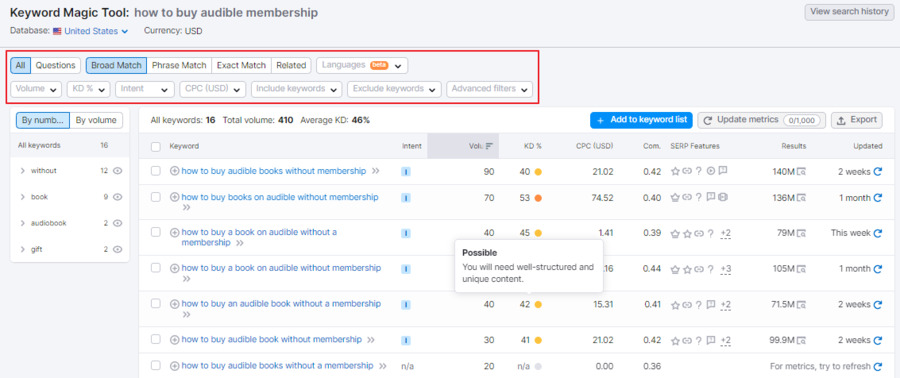
- Keyword Manager
In the Keyword Manager on Semrush, you can check all the keyword lists you have saved. The best part is that you can also export the report to a CSV or XLSX file.
After you find the best keywords from your keyword lists, you can also export them directly to the PPC Keyword Tool or the Positions Tracking Tool on Semrush.
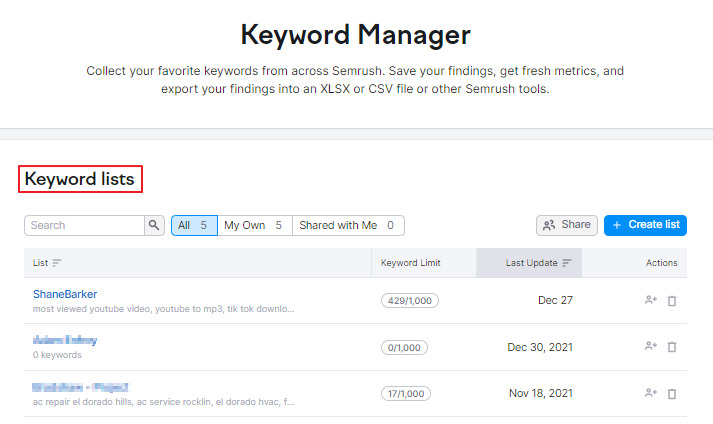
- Position Tracking
With the Position Tracking tool in Semrush, you can also track any site’s daily rankings for any set of custom keywords.
In the report, you can track and compare locations or devices in just one project.
You can also use this tool to find opportunities for featured snippets, local competitor discovery, and local SEO tracking.
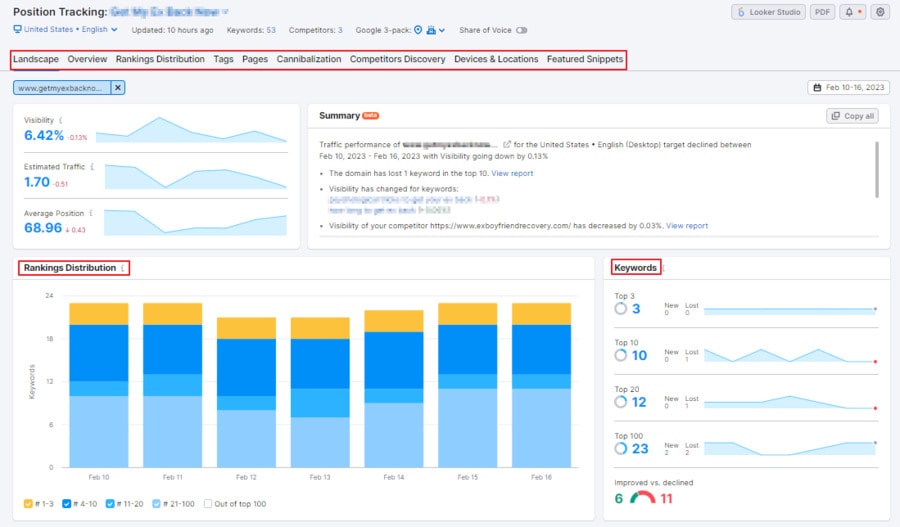
- Organic Traffic Insights
You can find data from Google Analytics, Google Search Console, and Semrush together in the Organic Traffic Insights dashboard. Using this tool, it’s easy to find the “not-provided” keyword list from Google Analytics.

- Keyword Gap
Using the Keyword Gap tool on Semrush, you can compare the keyword profile of up to five domains at once. You can also check the shared keywords and the keywords that are unique to both domains.
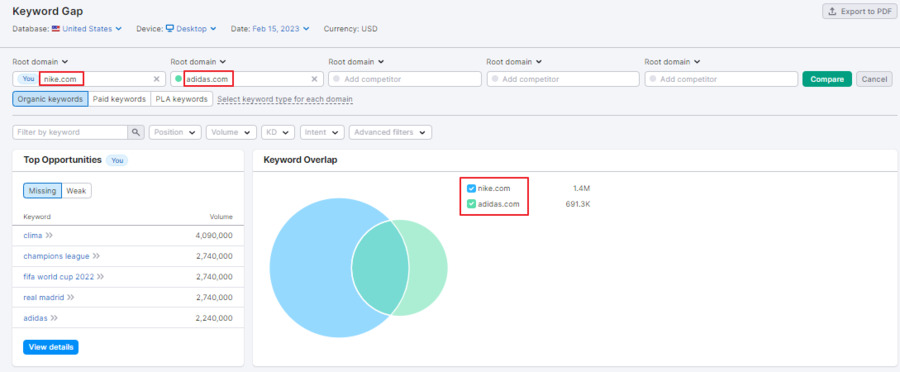
- Organic Research
Using the Organic Research tool, you can find out which keywords your competitors get their traffic from. You can also track top position changes and the overall organic keywords trend.
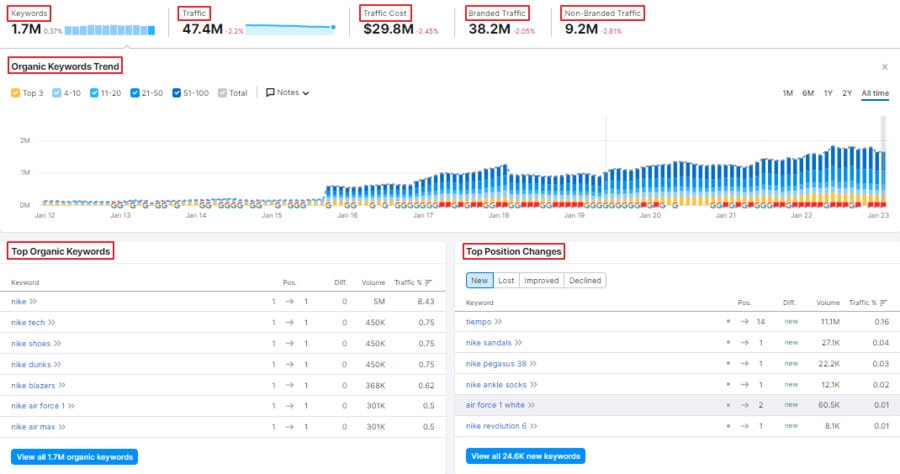
If you’d like a detailed review off the awesome features Semrush has to offer, check out my full Semrush review.
Key Features
- Check keyword difficulty, intent, search volume, CPC, and more
- Get thousands of keyword suggestions from one seed keyword
- Compare five keyword profiles at once
- Find your competitors’ most profitable keywords along with key metrics
- Create master lists with up to 1000 keywords at once
Pricing
- Pro Plan: $129.95/month
- Guru Plan: $249.95/month
- Business Plan: $499.95/month
2. Ahrefs
Ahrefs is one of the most popular SEO tools out there, and there’s a good reason for it. Their keyword database has over 7 billion keywords in over 171 countries.
What’s more, they process large clickstream data across 10 different search engines.
Using this keyword research tool, you can estimate keyword volumes for Google, Amazon, YouTube, Baidu, Bing, and other search engines.
How to use Ahrefs for keyword research
Ahrefs offers two main tools for analyzing keyword profiles: Ahrefs Webmaster Tools, and Keywords Explorer Tool.
1. Ahrefs Webmaster Tools
Ahrefs Webmaster Tools is for website owners who want a free keyword research tool. It’s similar to Google Search Console (GSC).
Along with finding the keywords that your site is ranking for, you can also find the keyword difficulty (KD). Plus, you can check the volume, CPC, traffic, position, and other details for organic keywords.
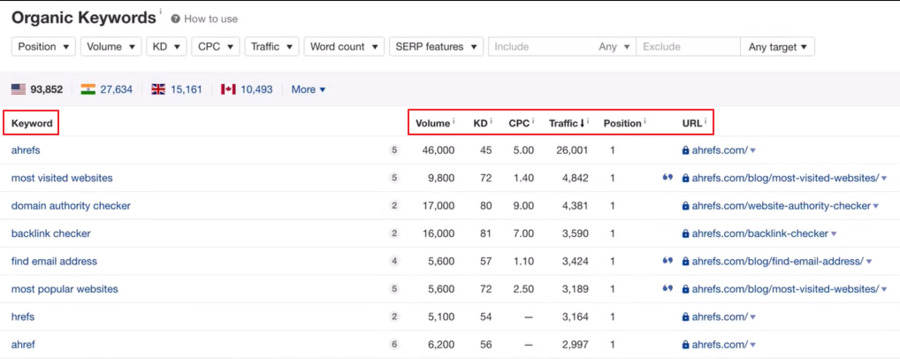
2. Keywords Explorer Tool
Using the Keywords Explorer Tool on Ahrefs, you can get keyword suggestions, check search volume, keyword difficulty, position history, and more.
What’s unique about this keyword research tool is that you can also see the estimated number of clicks for each keyword you enter.
Here’s how you can use it for keyword research:
When you enter your keywords into the search bar on Ahrefs Keyword Explorer, the tool will you a quick overview.
You can check the keyword difficulty, volume, global volume, and traffic potential at the top of the report. Using Ahrefs, you can check Ahrefs data for different countries and different search engines.
For this example, I am checking the keyword data for “how to lose weight” in the USA on Google:

When you scroll down, you’ll see the Keyword ideas section.
Using it, you can find relevant questions that users are asking related to your keyword. This information can be really useful while planning the headings and sub-headings for your content.

With the SERP Overview section, you can find the pages that make it to the top of the SERPs for any entered keywords. In the report, you will also be able to check the key SEO metrics for the top pages.
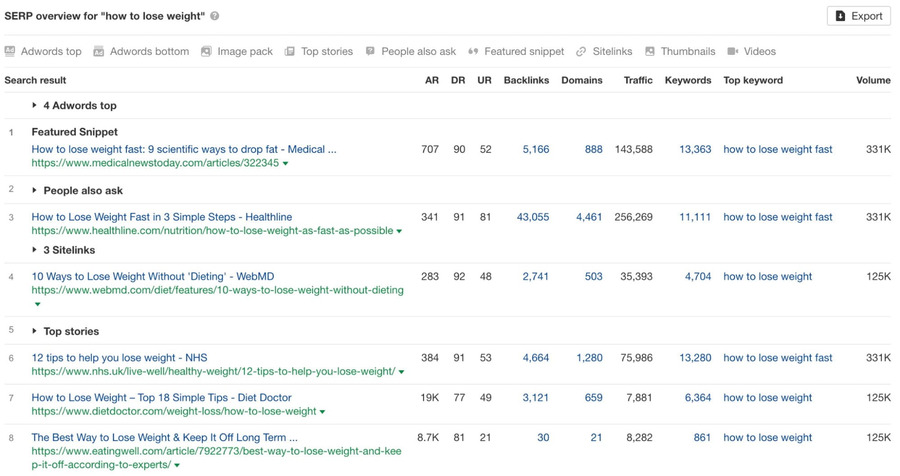
Key Features
- Check search volume, clicks metric, organic traffic potential, and more
- Generate keyword ideas with phrase matches, questions, and other options
- Use advanced filters to find keywords by keyword difficulty, search volume, and other metrics
- Check the ranking history of top posts on the SERP
- Find groups of keywords and sub-topics that have the same parent topic
- Find SEO metrics for top ranking pages on the SERPs
Pricing
- Lite Plan: Starts from $99
- Standard Plan: Starts from $199
- Advanced Plan: Starts from $399
- Enterprise Plan: Starts from $999
Note: Stuck between choosing Semrush or Ahrefs Check out my detailed comparison Semrush vs. Ahrefs..
3. Moz
Using Moz’s Keyword Explorer tool, you can easily check the monthly volume, organic CTR, and other key metrics for any keyword. You can even scroll to analyze the SERP rankings and get keyword suggestions.
Let’s say, you want to check the key metrics for “best PS4 games.”
Through a quick look, you can figure out that this keyword is going to be difficult to rank for. But the report shows that the estimated organic CTR is 100%.
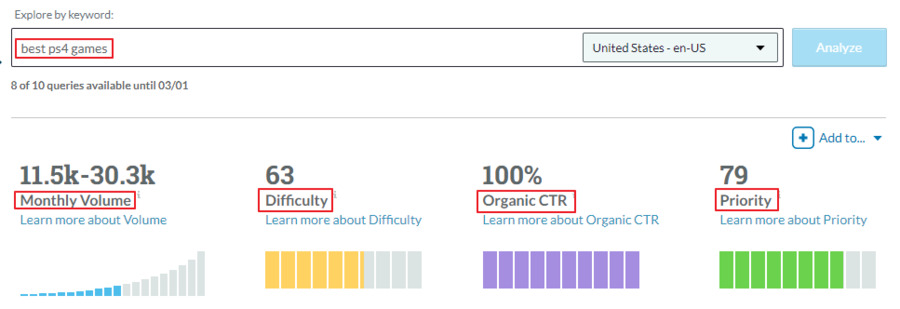
My favorite part about this report is that you can see the “Priority Score” for any keyword. It helps you figure out if the keyword you’ve entered is worth chasing after.
Moz calculates the score based on the keyword difficulty, volume, and organic CTR. It also takes into consideration a metric called, “My Score.” You can set it based on how important you think a keyword is for you.
When you scroll down, you can also check the top keyword suggestions, their monthly volume, and the top pages in the SERPs.
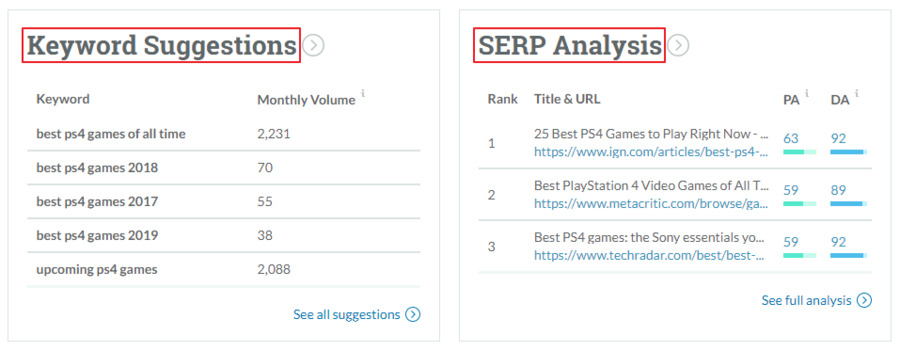
When you click on the Keyword Suggestions report, you can add filters, group keywords, and select the total volume.
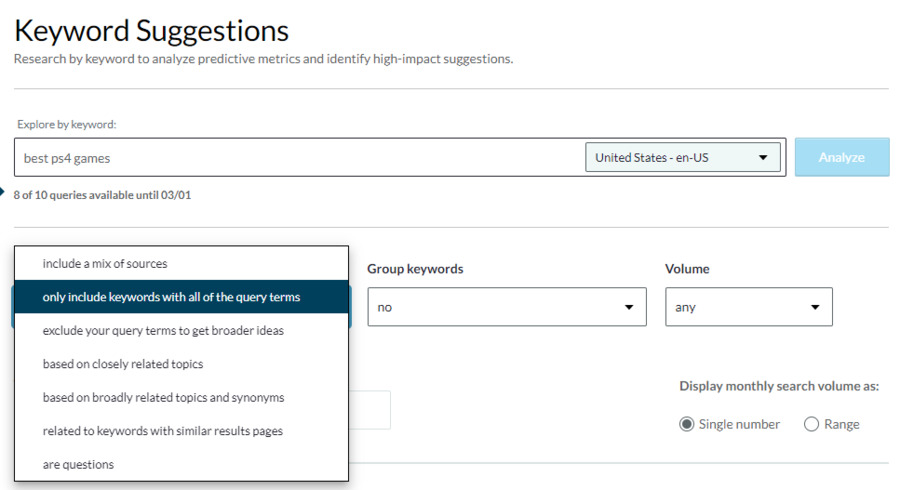
In the SERP Analysis report, you can check the organic results on page one.
Additionally, you can also check their page authority (PA), domain authority (DA), page score, and the number of referring domains to the page.
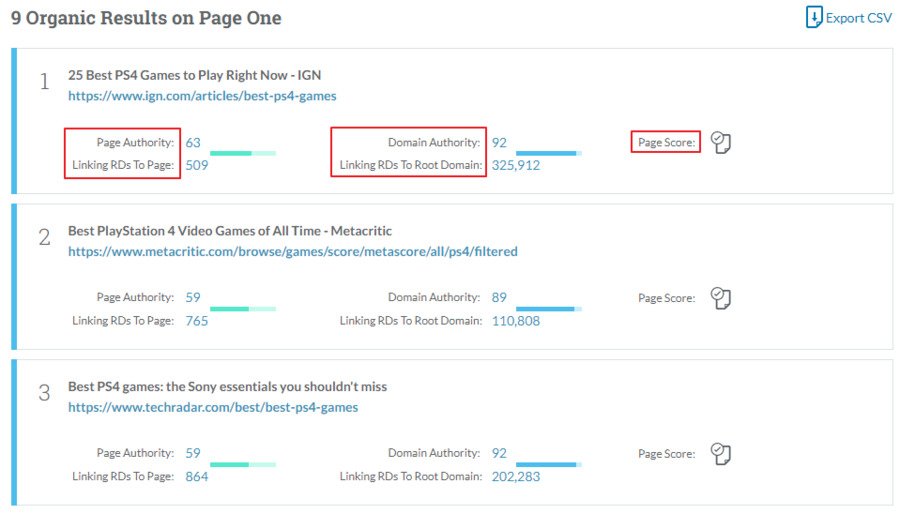
You can even check the ranking keywords for any website or compare the keyword profiles for two domains.
For example, here is the competitor overlap report for Asics, Skechers, and Puma.
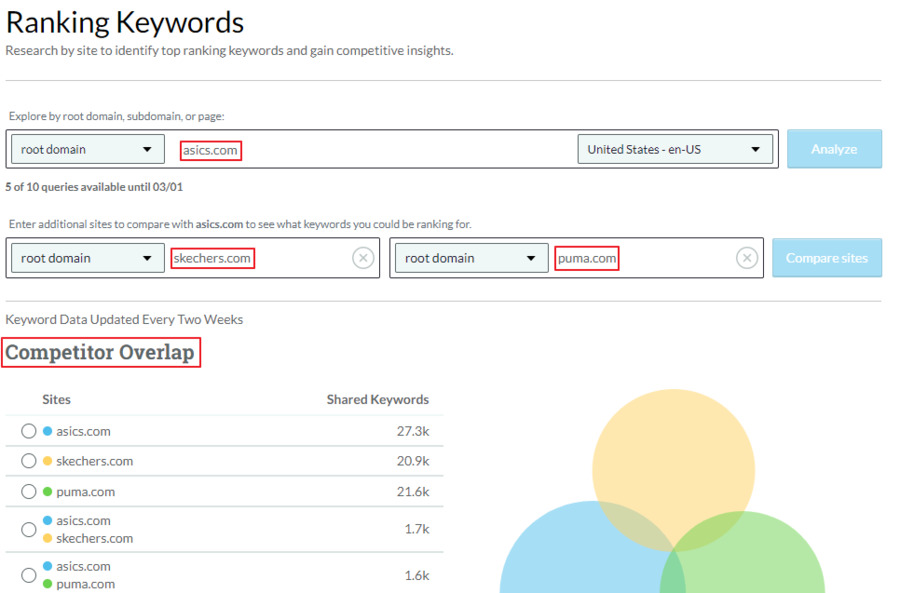
Key Features
- Check top ranking keywords, ranking distribution, organic CTR, monthly search volume, and more
- Conduct keyword research by domain, keyword, subdomain, or exact page
- Check top SERP results for any keyword you enter
- Create and manage keyword lists
- Get intuitive keyword suggestions and compare keywords for which site rank
Pricing
- Standard Plan: $99/month
- Medium Plan: $179/month
- Large Plan: $299/month
- Premium Plan: $599/month
Note: To see how Moz fares up against Semrush and Ahrefs for keyword research, check comparison post on Semrush vs Moz vs Ahrefs.
4. Google Search Console
Google Search Console is an effective SEO tool to evaluate your website's performance, including average Google positions, impressions, and click-through rate, particularly if you are already receiving search traffic.
To use Google Search Console for keyword research, you can go to the “Queries” tab. You’ll be able to find the top keywords along with their CPC, volume, clicks, impressions, and more.
If a keyword has a high number of impressions and clicks, it is likely that your website is ranking well for that keyword.
There’s also another way to use Google Search Console for keyword research. You can go to the “Pages” tab and click on the link you want to find the keywords for.
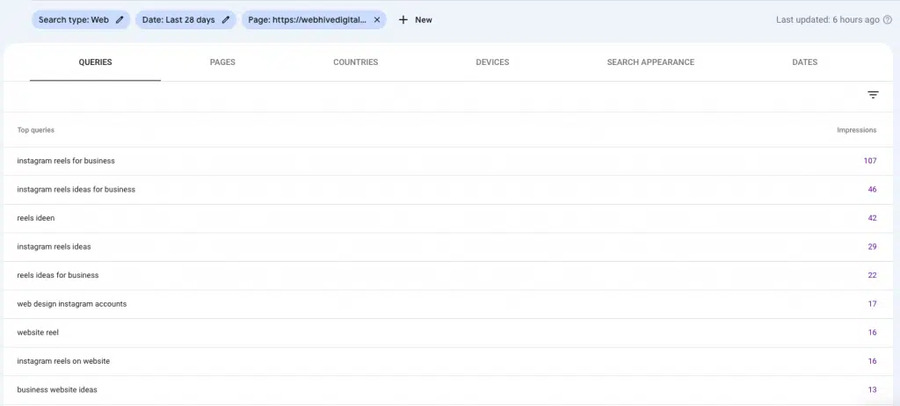
Next, click on the “Queries” to find relevant keywords along with their impressions. With this data, you can find the keyword that gets the highest impressions.
Based on that, you can work on-page optimization.
Key Features
- Check keyword ranking, click-through rate (CTR), organic traffic, average position, and other key metrics
- Check top pages in the SERPs
- Check your site for any penalties including low-quality content, keyword stuffing, keyword cannibalization issues
- Identify negative keywords that increase your bounce rate
- Find keywords related to different search intents
Pricing
- Free to use
5. Mangools
Mangools is a cost-effective alternative to other SEO tools as it offers four tools in one.
By signing up for Mangools, you gain access to KWFinder for keyword research, along with SERPChecker for analyzing the SERPs and LinkMiner for tracking links.
KWFinder is one of the beginner-friendly SEO keyword research tools on the market. It’s cheap, accurate, and gives you all the basic data you need.
I used it a few years ago when I was looking for a reliable Google Keyword tool alternative. And my experience with it was really good. I love that the platform is intuitive and easy to understand.
Using KWFInder, you can discover long-tail keywords, identify local search keywords, view keyword metrics, and filter unprofitable keywords.
Additionally, you can conveniently arrange your keywords, upload them in bulk, and apply filters to identify unprofitable ones.
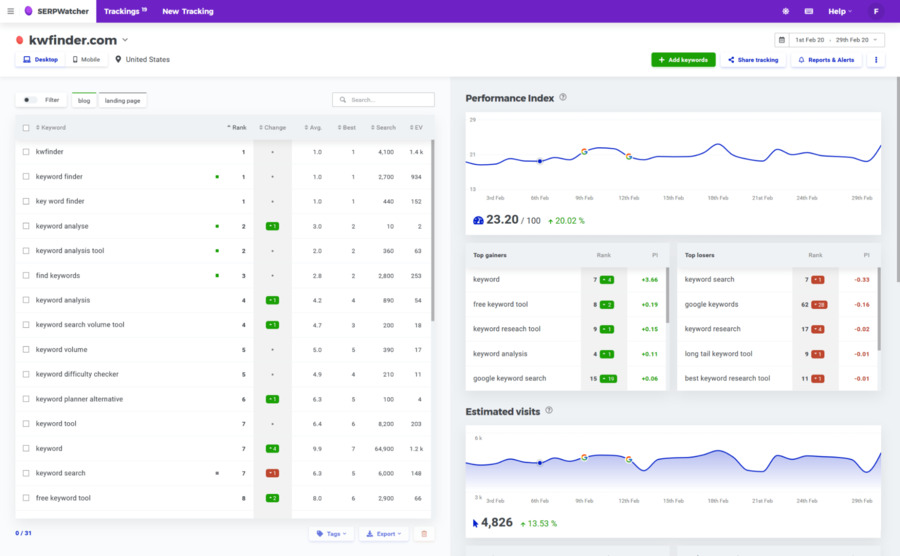
With the SERPChecker, you will be able to analyze the top pages in the SERPs and check their DA, PA, referring domains, and other key metrics.
Using this tool, you can even compare how your site compares to other sites that are rankings.
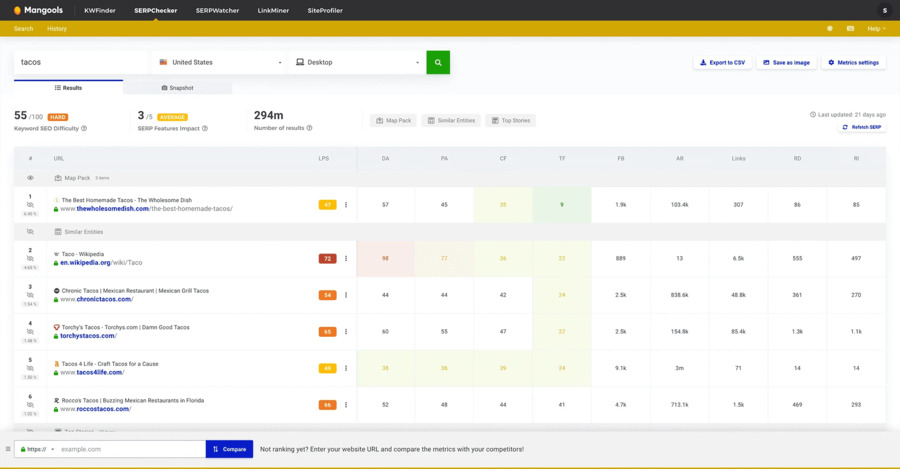
Key Features
- Get historical data about keyword trends and search volumes
- Generate keyword suggestions based on your seed keyword
- Track competitors’ keywords and assess changes in ranking
- Check top-ranking pages for any keyword along with their key metrics
- Check location-specific long-tail keyword data
Pricing
- Mangools Basic Plan: $49/month
- Mangools Premium Plan: $69/month
- Mangools Agency Plan: $129/month
6. Serpstat
Serpstat is a comprehensive keyword research tool that provides features that will help you analyze any domain’s complete SEO profile. Using it, you can find their top-ranking keywords as well their key metrics.
If you are looking for in-depth keyword analysis, you will appreciate Serpstat's unique keyword research feature.
It helps to identify the market share of all domains within the top 100 search results for a given keyword, allowing you to identify popular and risky keywords.
Additionally, Serpstat sets itself apart from other SEO keyword research tools by providing information on all domains advertising for your targeted keyword, along with the type of ads they are running. This data can be beneficial for improving CPC.
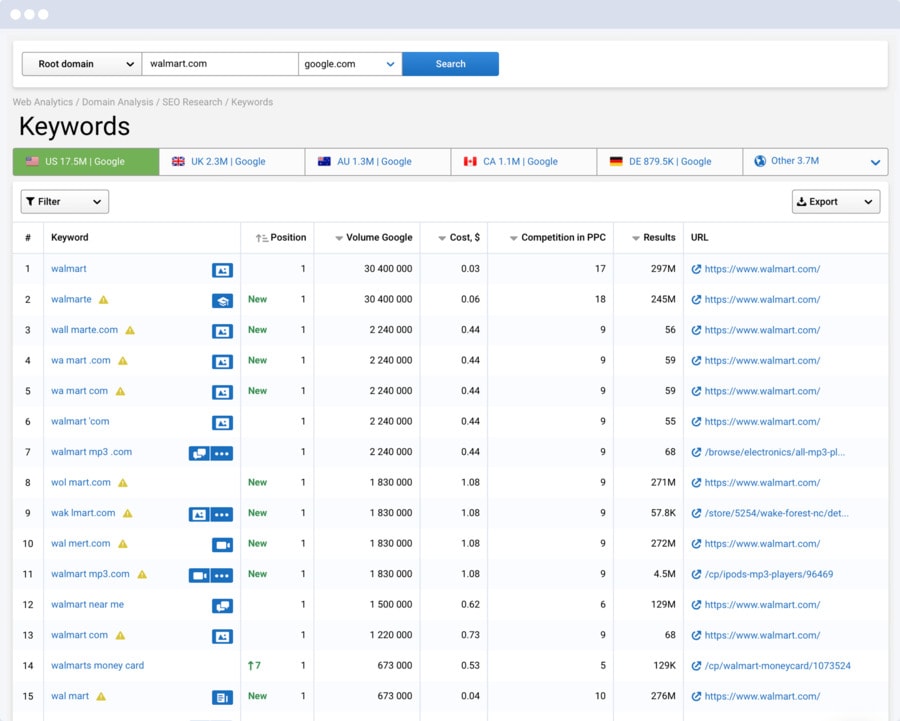
Key Features
- Check keyword difficulty, estimate keyword costs, and find the most profitable keywords in any niche
- Analyze monthly search volume, CPC, and find opportunities for ranking
- Identify closely or loosely related keywords for semantic searches
- Analyze keywords that your competitors are ranking for in organic or paid search
Pricing
- Lite Plan: $69/month
- Standard Plan: $149/month
- Advanced Plan: $299/month
- Enterprise Plan: $499/month
- Customized plans available
7. SpyFu
SpyFu is a widely-used competitive intelligence tool that can assist in identifying competitor keywords. Its exclusive focus on competitive intelligence research sets SpyFu apart from other similar keyword research tools.
SpyFu provides an impressive amount of data even for basic or preliminary searches.
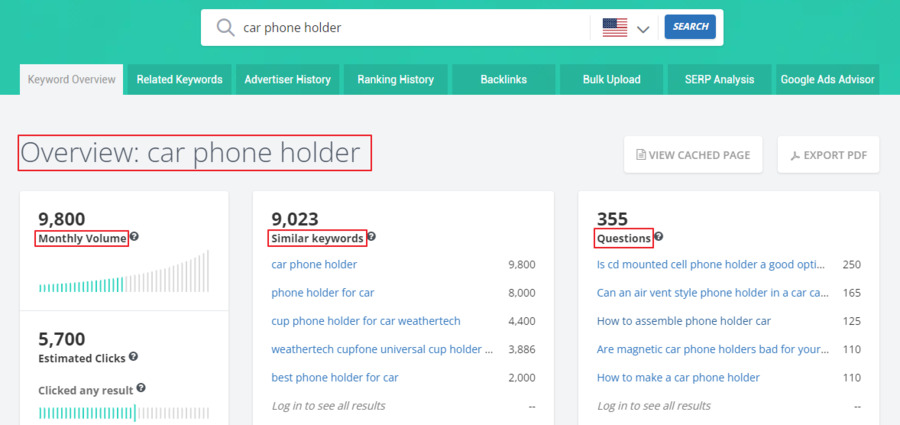
You can find data on global and local monthly search volume, ranking history, CTR, backlinks, ad spend, and ad groups.
These insights can help you figure out what your competitors are up to.
What’s more, you can check the Organic Search Ranking Analysis report to find ranking difficulty in SERPs, monthly clicks, keywords in URL, and more information.
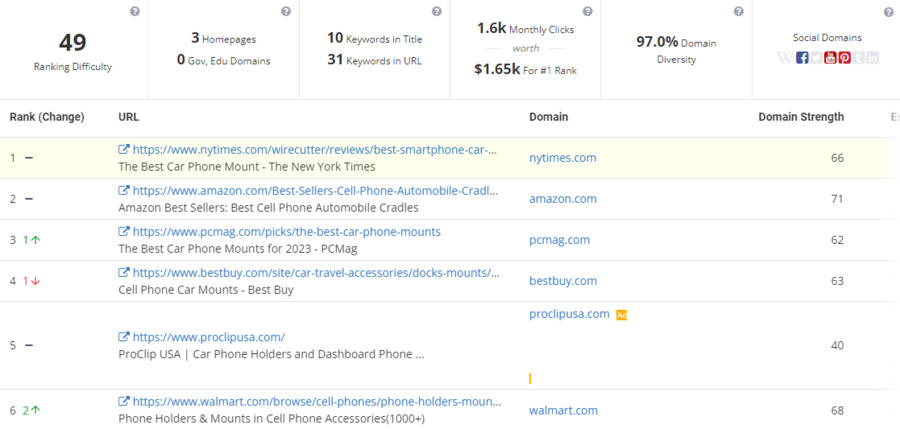
Key Features
- Check historical data for keywords along with traditional metrics
- Find “mobile vs desktop”
- Identify branded, risky, and related keywords
- Analyze keywords in bulk and export a full list
- Preset filters like “domains with the biggest gains” to extract specific data
- Check top pages ranking for any keyword
Pricing
- Basic Plan: $39/month
- Professional Plan: $39/month for the first month; $79/month after first month
- Team Plan: $299/month
8. Rank Tracker
Rank Tracker is a time-saving tool for collecting keywords across multiple search engines. By filtering through Google, Yahoo, Bing, and Amazon, it presents a comprehensive list of keyword variations that other tools may miss.
This includes less obvious keywords that are often overlooked. In addition, the tool's free version provides users with traffic potential and competition-level data for each keyword.
Using this keyword research tool, you can also check the historical data of any keyword and the change in search volume over a period of time.
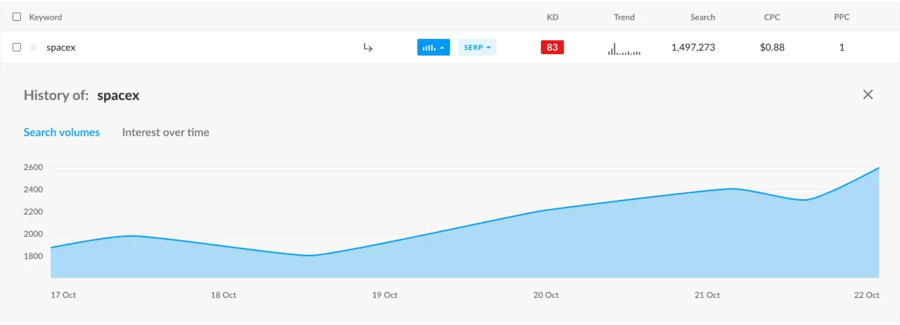
You can also discover opportunities for ranking in the SERPs for any keyword you enter. Along with the top ranking pages, you can find the CPC, PPC, trend, and keyword difficulty for any keyword.
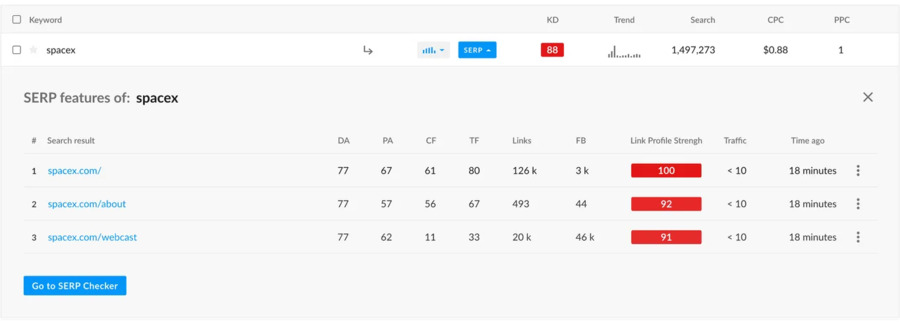
For those who require more advanced features, Rank Tracker offers a paid version. However, the free version is suitable for basic keyword research needs.
The tool's ability to scrape search suggestions across multiple engines, including Amazon, makes it especially useful for e-commerce sites looking to optimize their product pages for search.
Key Features
- Find related long-tail keywords to any seed keyword along with keyword difficulty score
- Find the ranking history for keywords to identify seasonal trends
- Create customized keyword lists and save them to the dashboard
- Check search volume, CPC, and PPC for each keyword
- Check if SERPs show previews or featured snippets for keywords
Pricing
- Starter Plan: $16.20/month
- Double Data Plan: $53.10/month
- Quad Data Plan: $98.10/month
- Hex Data Plan: $188.10/month
9. Google Keyword Planner
Google Keyword Planner is a top PPC keyword research tool, and it's completely free. It has two primary functions: exploratory keyword research and in-depth search volume and forecasting.
The “Keyword ideas” feature generates new keyword ideas, monthly search volume, competition, and bid ranges. You can refine your keyword list and use the “Forecast” feature to plan for paid ads and budget.
Keyword Planner can also help save on PPC costs by highlighting areas where organic ranking is beneficial.
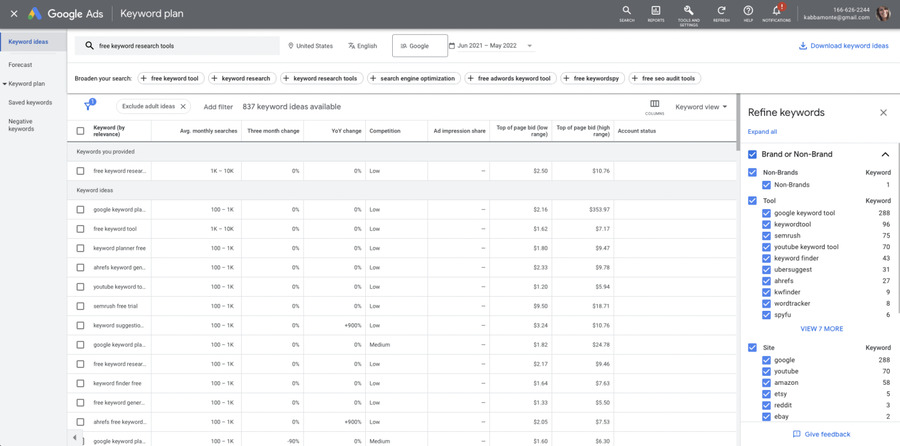
Key Features
- Discover new keyword ideas related to your website, services, or products
- Check the monthly searches for any keyword
- Determine the approximate cost for your ad to appear on searches for a specific keyword
- Check historical keyword data
- Get forecasts for your keyword plan broken down by location, top keywords, and devices
- Organize keywords into categories for better targeting
Pricing
- Free
10. Jaaxy
The Jaaxy keyword research tool is simple to use. Simply input a keyword, topic, or URL, and the tool will provide a list of related keywords and their statistics, such as average monthly search volume, traffic, number of competing domains, and more.
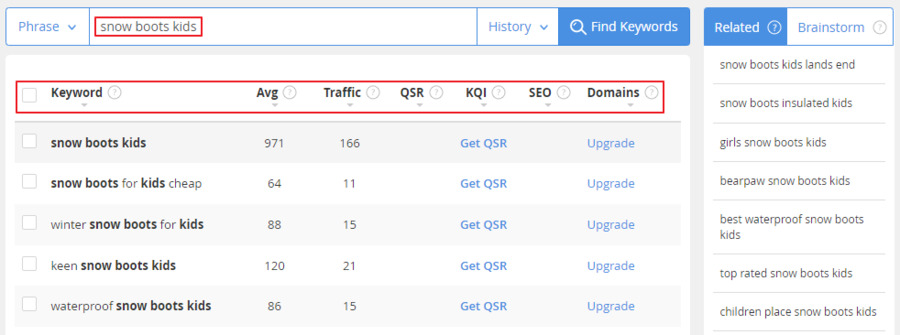
One feature that stands out is Jaaxy's ability to help users locate affiliate programs.
By switching to the Affiliate Programs tab and entering a keyword, you can view a list of affiliate programs from various sources, including Commission Junction and ClickBank.
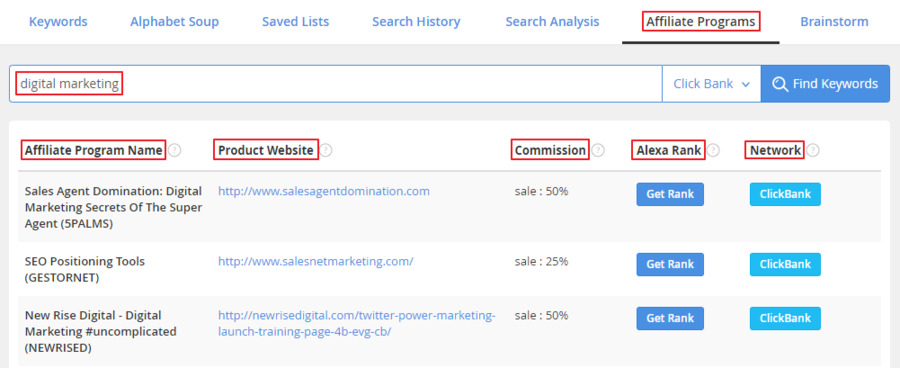
Jaaxy also displays the commission percentage and Alexa Rank for each program and its associated product website.
Although Jaaxy's free plan is somewhat limited, its paid plans are reasonably priced. They offer a good starting point for website owners looking to monetize through affiliate marketing.
Key Features
- Get search traffic data for keywords from Yahoo, Bing, and Google
- Get data on search volume, competition, and potential traffic for each keyword
- Save and export keyword lists along with key metrics
- Perform five keyword searches at once with the multithreaded search function
- Search and analyze affiliate programs based on a keyword
Pricing
- Starter Plan: Free with limited searches and lookups
- Pro Plan: $49/month
- Enterprise Plan: $99/month
11. Keyword Surfer
Keyword Surfer is a convenient keyword research tool that generates keyword ideas and search volumes without having to leave the Google search results page.
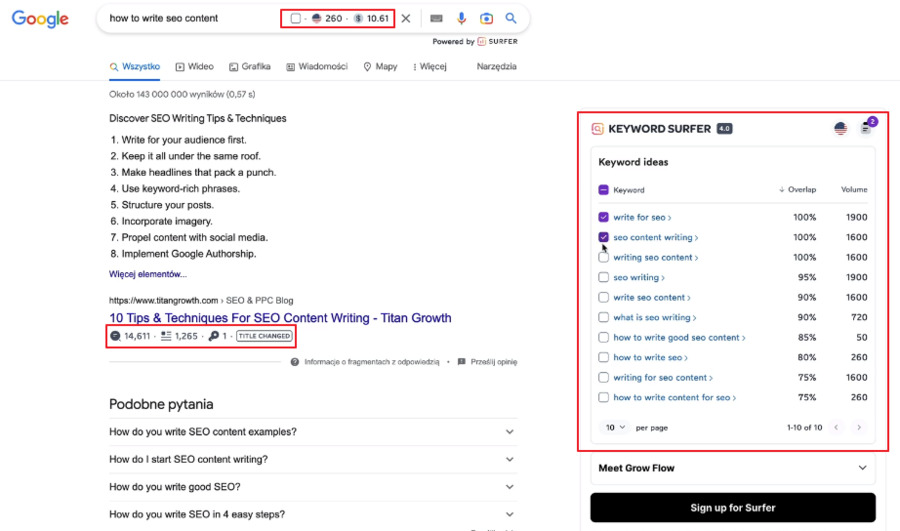
This tool enables you to obtain important insights on search volume, CPC, related terms, keyword suggestions, visibility metrics, and on-page data, for every new search.
Additionally, you can create keyword collections to easily bookmark essential keywords and export them as a .csv file whenever required, without having to search for them repeatedly.
With Keyword Surfer, you can streamline your entire content creation research process while staying on the Google results page, which is highly convenient.
Key Features
- Discover topic clusters based on a seed keyword
- Analyze the total monthly search volume, traffic, and keyword difficulty for any keyword
- Check on-page data, such as the word count, number of headings, and keyword density
- Find the search intent of each topic
- Organize keywords into groups for better organization
Pricing
- Basic Plan: $59/month
- Pro Plan: $119/month
- Business Plan: $239/month
- Enterprise Plan: Custom pricing available on request.
12. The Free Keyword Tool by WordStream
The Free Keyword Tool by WordStream is designed keeping in mind the needs of PPC marketers. Using it, you can get competition and cost data customized to your industry and country.
To get started, you can input a keyword and select your industry and country.
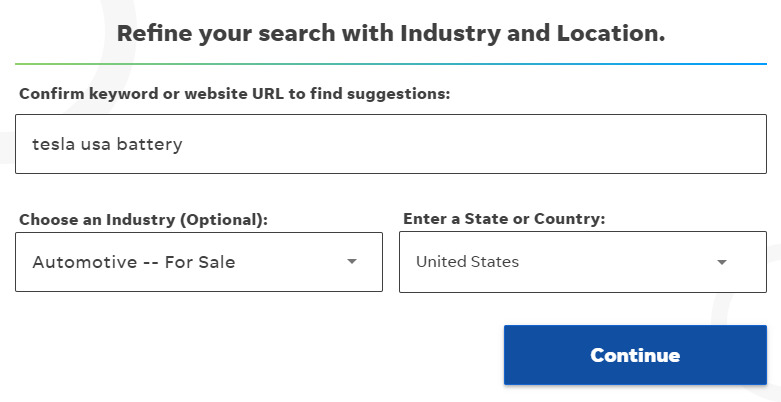
Once submitted, the tool generates a list of relevant keywords including long-tail variations, as well as their corresponding search volumes on Google and Bing.
Additionally, the user can enter a website URL, such as a competitor's homepage, to gain contextual keyword suggestions and insights to enhance their competitive edge.
With this keyword research tool, you can find their monthly search volume and page bids.

The free version shows only 25 keywords.
To obtain the complete list of keywords, you can submit your email address and receive the full keyword list for free.
Key Features
- Find cost data and competition data for any keyword based on your industry and country
- Filter keyword suggestions by industry
- Identify long-tail keywords, PPC keywords, negative keywords, Google Ads keywords, and more for any domain
- Check related keywords for any seed keyword
- Track keyword position changes over a period of time
Pricing
- Free
13. Keyword Suggestion Tool by SE Ranking
With the keyword suggestion tool by SE Ranking, you can thoroughly analyze any competitors’ keyword profile and find new keyword opportunities.
When you enter any keyword in this keyword research tool, you can find the total difficulty score, CPC, monthly search volume, similar keywords, and more.
In addition to this, you can also check the top-ranking pages for paid and organic search.
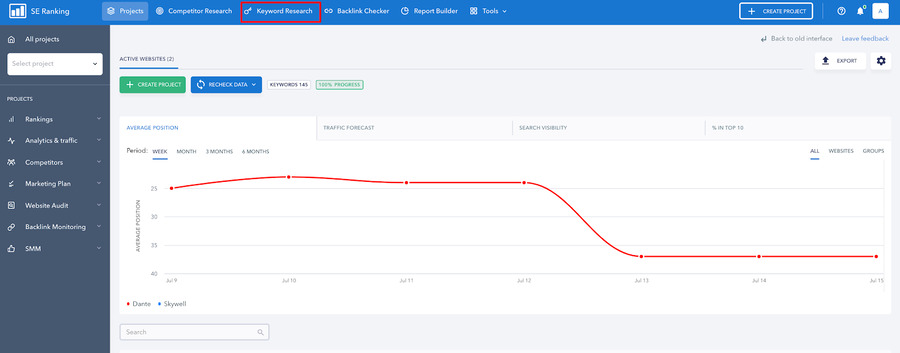
Using the Keyword Suggestion Tool by SE Ranking, you can also conduct bulk keyword analysis. You can either do this by manually entering the keywords or importing them via a .CSV or .TXT file.
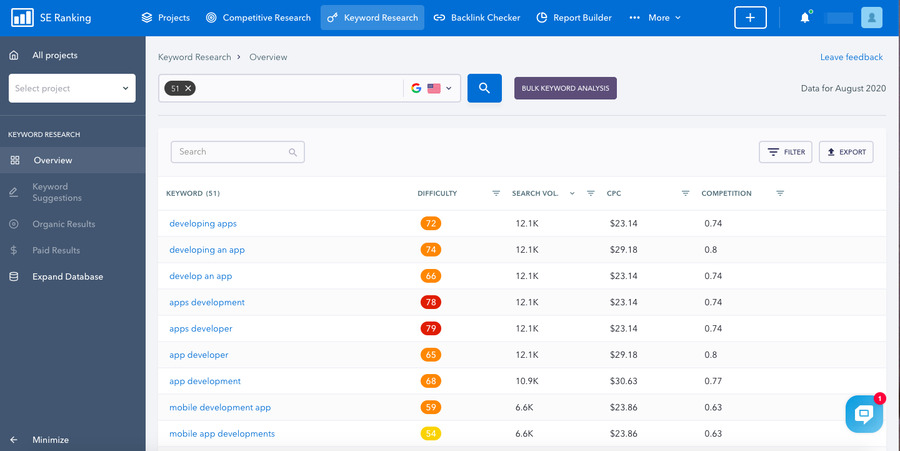
Key Features
- Check keyword search volume, CPC, and difficulty score
- Find related and similar keywords to a seed keyword
- Identify competitors who are targeting the same keywords
- Add keyword clustering settings to create custom lists
- Prevent keyword cannibalization by identifying pages that compete for the same keyword
- Spot keyword ranking changes immediately
Pricing
- Essential Plan: $39/month
- Pro Plan: $89/month
- Business Plan: $189/month
- Custom pricing available
14. KeywordTool.io
With KeywordTool.io, you can conduct keyword research for Google, YouTube, Instagram, Twitter, Pinterest, Amazon, eBay, and other sites.
You can generate hundreds or even thousands of keyword ideas in just a few seconds, by simply entering a seed keyword.
If you are using the free version, you can find related keywords for each keyword that you enter. To try out the tool, I entered the keyword, “best cafés in New York.”
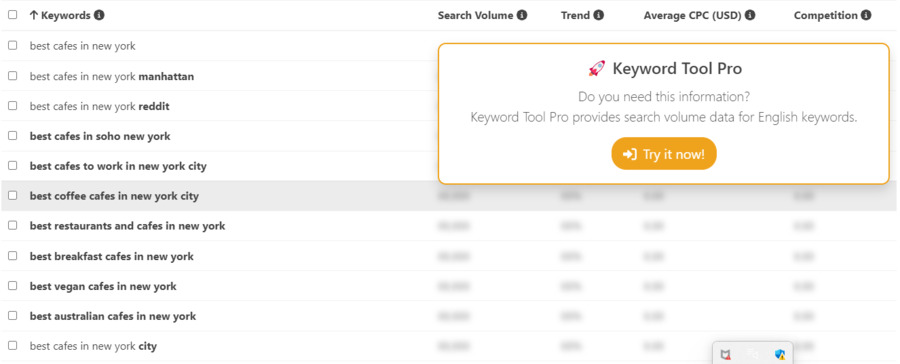
The tool also has a “Questions” tab that shows questions that users ask related to the entered keyword. For my query, I could see related keywords, but they aren’t really in the question format.
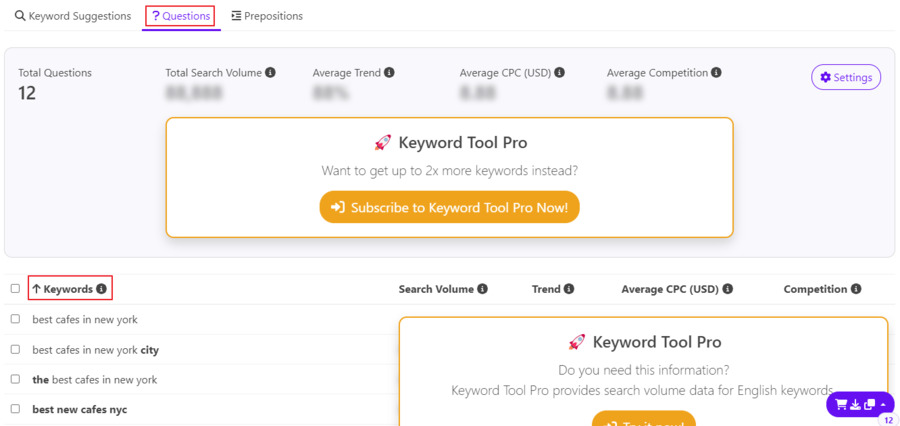
Nevertheless, it is a good way to find more related keywords.
If you go for the paid version, you can also find the search volume, trend, average CPC, and competition for each keyword.
Key Features
- Generate keyword suggestions for any keyword across multiple sites
- Check popular keywords that are hidden in Google Keyword Planner
- Find search volume, CPC, competition, and trend with the paid version
- Check Google Ads competition data
- Analyze keyword data in bulk
Pricing
- Pro Basic Plan: $89/month
- Pro Plus Plan: $99/month
- Pro Business Plan: $199/month
15. Keyword Sheeter
Keyword Sheeter is a powerful tool that can provide thousands of autocomplete suggestions from Google. To start generating keyword ideas quickly, simply enter one or more seed keywords and click “Sheet keywords.”
With the ability to pull around 1,000 ideas per minute, you can export the results for free in one click.
When I entered, “baby blankets cotton” in Keyword Sheeter, it showed me a long list of related keywords instantly.
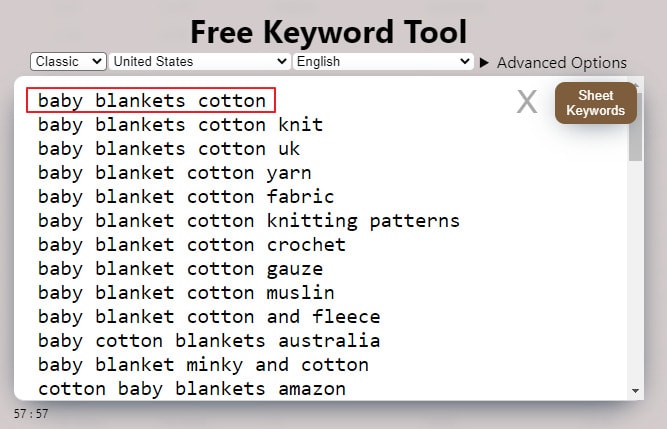
One drawback of Keyword Sheeter is its basic functionality, as it doesn't display search volumes or trend data, and it doesn't group keywords like other keyword research tools on the list.
However, it has a useful positive and negative filter feature.
For example, by adding “cotton” to the positive filter, the tool will only show queries that contain the word “cotton.”
The negative filter is a handy tool for eliminating irrelevant queries that contain certain words.
For instance, if you operate a website that sells sports equipment and scrape results for “football,” you may only want to see keywords relating to American football, not soccer.
You could exclude keywords like “soccer,” “FIFA,” “UEFA,” and “World Cup.” This helps to refine your keyword list and saves you time and effort by allowing you to focus on the most relevant results.
While it is a great feature, you’ll need to get access to the paid version to use this feature.
Key Features
- Get a list of related keywords for any seed keyword
- Filter out results based on positive or negative filters
- Check CPC bids and Google search volume
- Find top 100 SERP results for any keyword
Pricing
- Free plan available with limited features
- Basic Storage Plan: $9/month
- Starter Search Volume Plan: $49/month
- Scale Search Volume Plan: $90/month
16. Soovle
Soovle is a free online tool that offers an intuitive and straightforward interface for keyword research. The tool is designed to give you a comprehensive overview of keyword ideas across Google, Bing, Yahoo, Wikipedia, and Amazon.
Soovle allows you to enter a single keyword or phrase and generate a list of suggestions based on the search engine or platform you select.
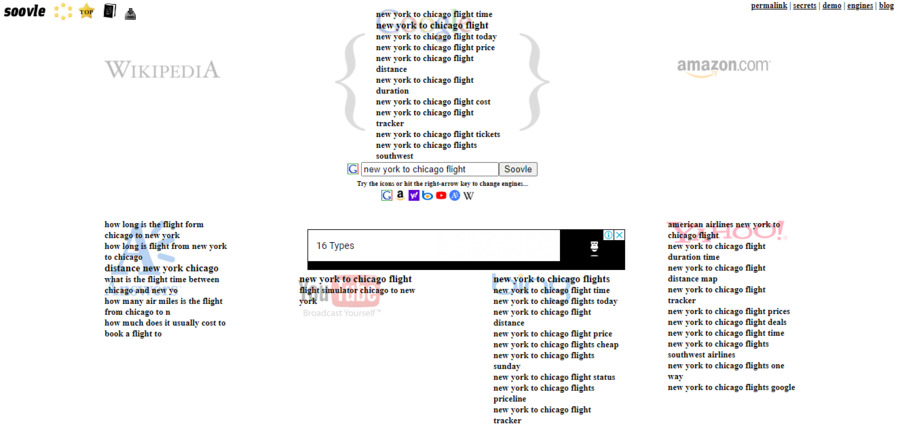
This makes it an excellent tool for identifying popular search terms and discovering new content ideas. Soovle also includes a “Save” feature that enables users to save their keyword research and access it later, making it easier to manage and analyze the data.
Key Features
- Get keyword suggestions for multiple websites together
- Check top internet keywords for YouTube, Amazon, and other sites
- Save keyword suggestions to create customized keyword lists
Pricing
- Free
17. Keyword Revealer
Keyword Revealer has multiple tools that can help you with keyword research. If you are looking for keyword suggestions, you can check their Keyword Brainstorming tool.
For each seed keyword, the platform shows related keywords in a tree format. It groups them in an organized silo structure that you can even expand by clicking on a branch.
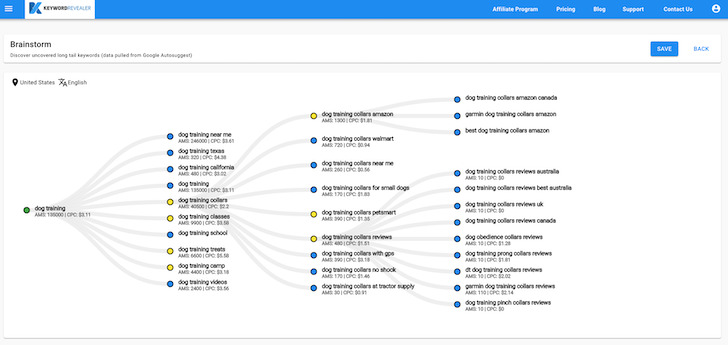
Using the Keyword Research tool, you can also find the search volume, trend, PPC, CPC, and keyword difficulty for any keyword.
The report has a section covering the top-ranking URLs along with their Domain Authority, Page Authority, and other important metrics.
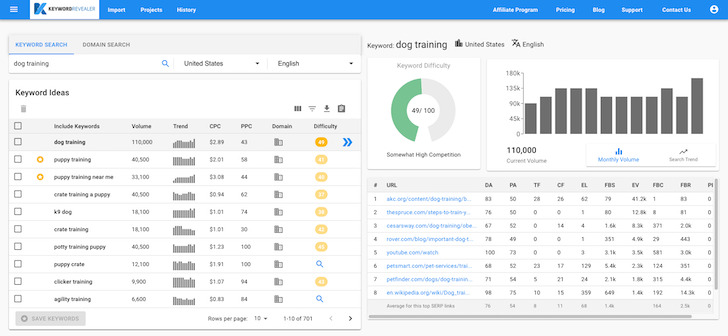
Their Rank Tracker tool automatically keeps a track of the changing keyword positions on Google every day. You can use it to analyze how the position of a keyword has changed in a week, month, or year.
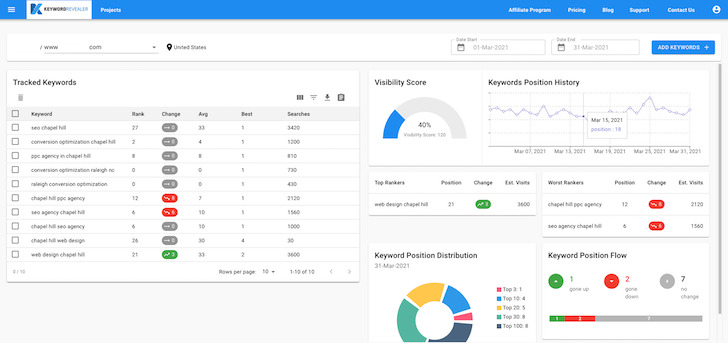
In addition to its keyword research capabilities, this tool also has options for Site Analysis and Backlink Analysis. It’s a great pick for any marketer who wants advanced capabilities at an affordable price.
Key Features
- Get multiple keyword suggestions for a seed keyword
- Identify easy-to-rank keywords with high search volumes
- Check keyword difficulty and analyze the competition for any keyword
- Track the changes in keyword position for a specific time range
Pricing
- Free plan available
- Basic Plan: $19.97/month
- Pro Plan: $27.97/month
- Elite Plan: $47.97/month
18. QuestionDB
QuestionDB is a unique keyword question tool that can be incredibly valuable for writers and marketers looking to grow their blog.
To get started, you can pick a broad keyword. If you have a website that published content around food and nutrition, you can pick a keyword like “keto.”
The tool takes about a minute to find questions related to the given keyword.
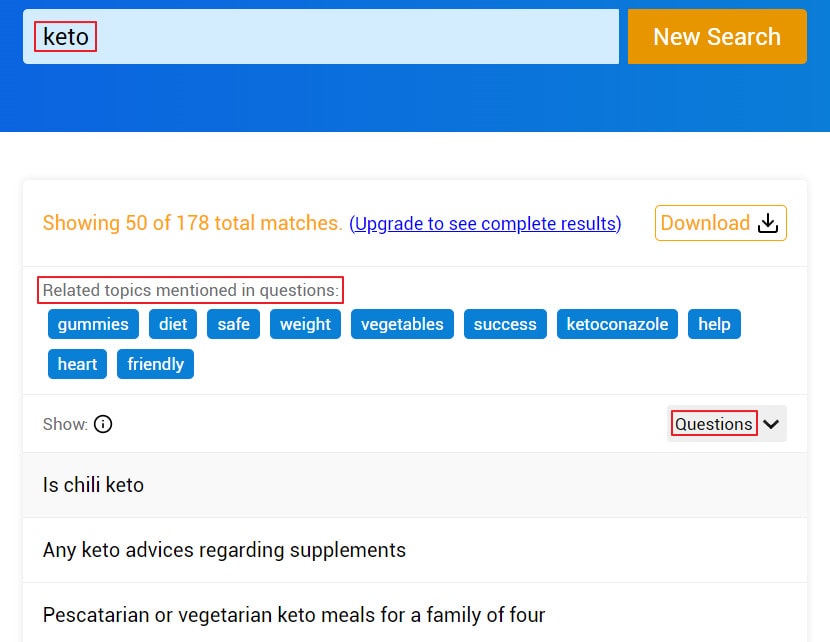
The first few results aren’t questions, but phrases related to the given keyword. But it’s a long list of results. And as I scroll further down the list, I can find questions related to the given keyword.
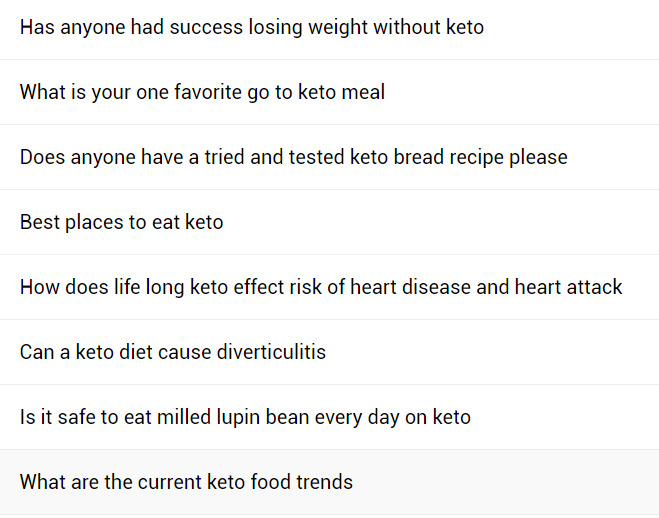
If you’d like to find related keywords only, you can toggle to the “Keywords” option from the drop-down menu on the left.

Once you have your list, you can come up with seed keywords like “keto dinner” or “keto snacks.” You can also search them individually on QuestionDB to get a list of specific questions about these topics.
This can give you content ideas for your blog and help you understand what your target audience is searching for.
Key Features
- Get an exhaustive list of questions for any seed keyword
- Find related topics to your seed keyword
Pricing
- Free plan available
- Pro Plan: $12.5/month
- Agency Plan: $41/month
- If you subscribe for the annual plan, you get 2 months subscription free.
19. Keyworddit
Keyworddit is a one-of-a-kind tool that retrieves keyword ideas from Reddit. Simply type in a Subreddit, and it will examine up to 500 keywords from the titles and comments of threads.
Keyworddit is a superb resource for individuals who are new to a niche. Suppose you want to launch a blog about the stock market, but you don’t know the trending topics for it.
In that case, you can obtain ideas from /r/wallstreetbets to learn what your target market is interested in.
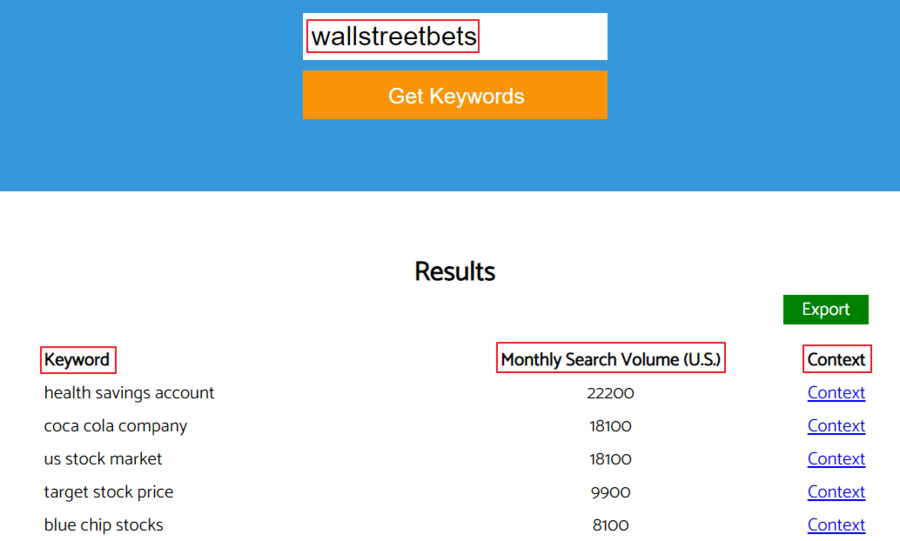
Apart from generating concepts, the tool displays estimated US monthly search volumes for each keyword, providing a sense of each subtopic's popularity.
If you want to delve deeper into a keyword, click the “Context” link to review the threads in Google where the keywords were obtained.
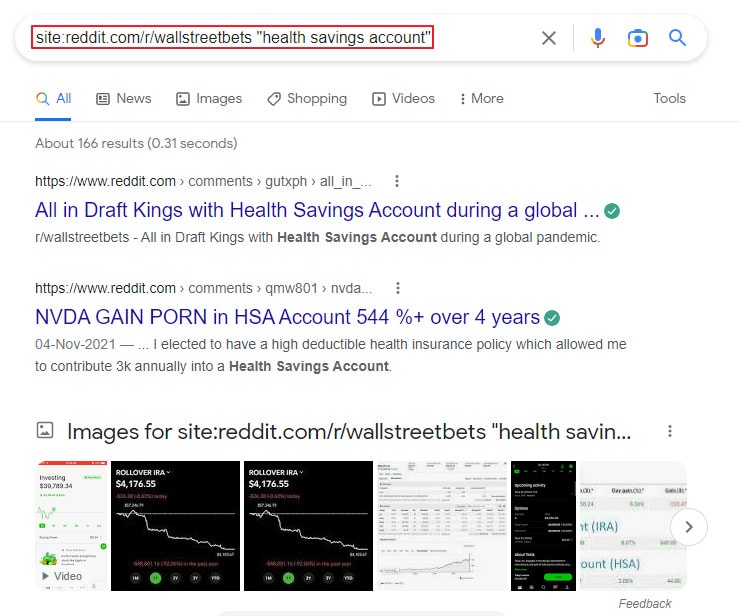
This platform by Reddit is a mix of a social listening tool and a keyword research tool. It’s not meant to replace advanced keyword research tools like Semrush or Ahrefs.
But it can be a good supplementary keyword research tool.
Key Features
- Generate a list of keyword suggestions based on a Subreddit
- Find out monthly search volume for popular keywords
- Check Reddit discussions about a specific keyword
- Check popular Subreddits for common keywords
- Can export the list of Reddit keywords
Pricing
- Free
20. AnswerThePublic
Answer the Public is a useful keyword tool that provides a different approach to keyword research. For any seed keyword you enter, you can find the main related questions that start with:
- What
- Why
- Where
- Which
- When
- How
- Will
- Can
For example, if you run a travel blog, entering “Europe travel” in Answer the Public generates questions such as “How to travel to Europe on a budget?” or “What to expect when traveling to Europe.”
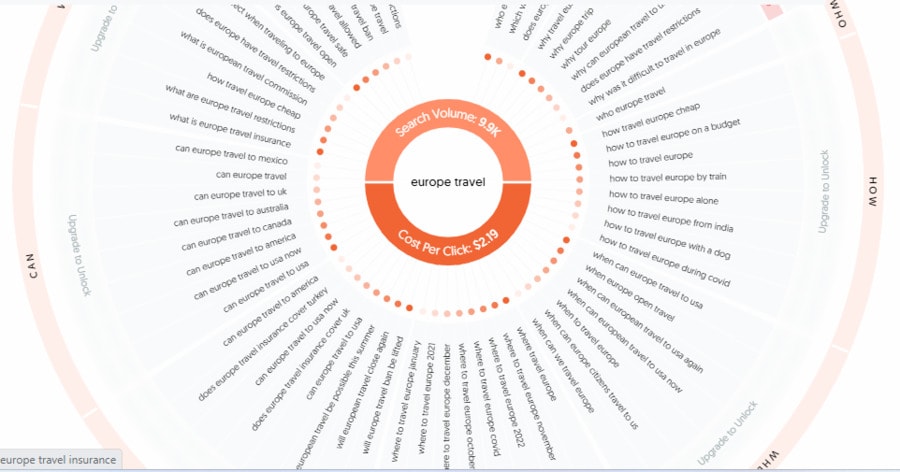
For the most relevant results, I would recommend you add search queries that have only 1–2 keywords.
When you click on a question from the search wheel, you’re redirected to the SERP for that keyword.
From the questions in the search wheel, you can create FAQ pages or add subheadings that cover those search strings.
By doing so, you can potentially increase your organic traffic. Moreover, the tool can help you determine what your target market is looking for on search engines like Google or Bing.
Key Features
- Check search volume, search difficulty, CPC, and paid difficulty for any seed keyword
- Find related questions for any keyword along with their search volume
- Get related keyword suggestions in alphabetical order
- Set up alerts to spot seasonal trends with their paid plan
- Compare search behavior changes over a period of time
- Organize your keyword research data with customized folders
Pricing
- Individual Plan: $9/month
- Pro Plan: $99/month
- Expert Plan: $199/month
Comparison of 10 Best Keyword Search Tools
If you want a quick comparison of all the 10 best keyword search tools listed in this post, check out this table:
No | Keyword Research Tool | Key Features | Pricing |
1 |
| Pro Plan: $119.95/month Guru Plan: $229.95/month Business Plan: $449.95/month | |
2 | Ahrefs |
| Lite Plan: Starts from $99 Standard Plan: Starts from $199 Advanced Plan: Starts from $399 Enterprise Plan: Starts from $999 |
3 | Moz |
| Standard Plan: $99/month Medium Plan: $179/month Large Plan: $299/month Premium Plan: $599/month |
4 | Google Search Console |
| Free to use |
5 | Mangools |
| Mangools Basic Plan: $49/month |
6 | Serpstat |
| Lite Plan: $69/month |
7 | SpyFu |
| Basic Plan: $39/month |
8 | Rank Tracker |
| Starter Plan: $16.20/month |
9 | Google Keyword Planner |
| Free |
10 | Jaaxy |
| Starter Plan: Free with limited searches and lookups |
Ready to try a Keyword Research Tool For Your SEO Campaigns?
By leveraging the right keyword research tool, you can gain valuable insights into the search habits of your target audience.
With the help of keyword data, you can create targeted and impactful content that is relevant to your audience. Plus, you can optimize your advertising campaigns based on keyword research.
If you’re willing to dive deep into keyword research, I would recommend you opt for Semrush, Ahrefs, Moz, or Google Search Console.
These tools have rich in-depth data that will find the right keywords and keep a tab on your competitor’s keywords.
But if they don’t fit your needs, check out other keyword suggestion tools from this list. Don’t wait — start using a keyword research tool now!

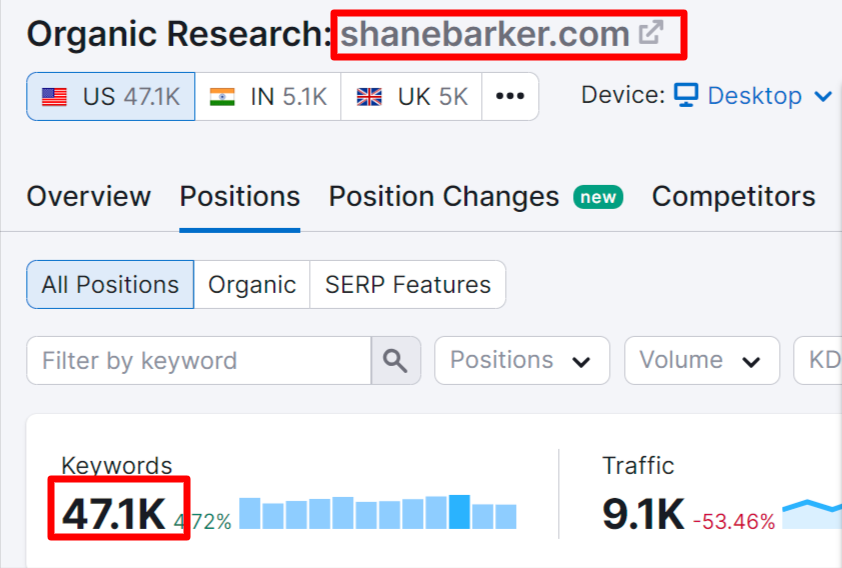


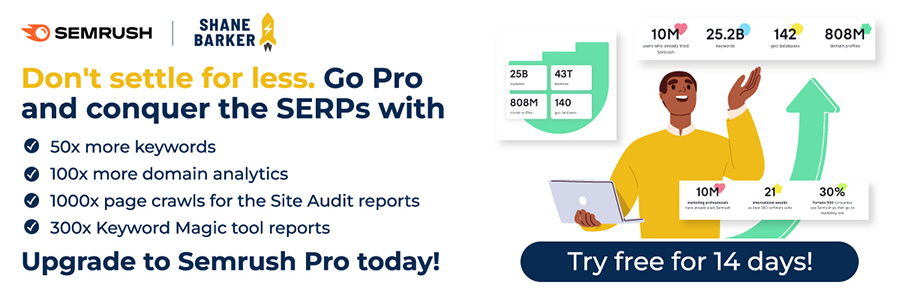



![20 best seo chrome extensions that you need to know in [year] 49 best seo chrome extensions that you need to know](https://shanebarker.com/wp-content/uploads/2021/09/seo-chrome-extensions.jpeg)








Keywords Everywhere is another great one. It is a browser extension that can be set by country and as the search in a browser takes place it shows the search quantity for the phrase as well as CPC. It also agrees with Google’s figures
I am really happy to see your post which is very good for readers.
The ultimate collection of keyword tools. Thanks for including which is completely free or not. that’s helped me to find a free one.
So here we go! Great List!
Thanks for sharing this!
My pleasure. Glad to help.
Nice blog!
Thanks a lot!
Remarkable! It’s in fact an awesome article.
Thank you so much!
Thanks for this inspirational and very well written article.
Thanks! Very nice to hear it.